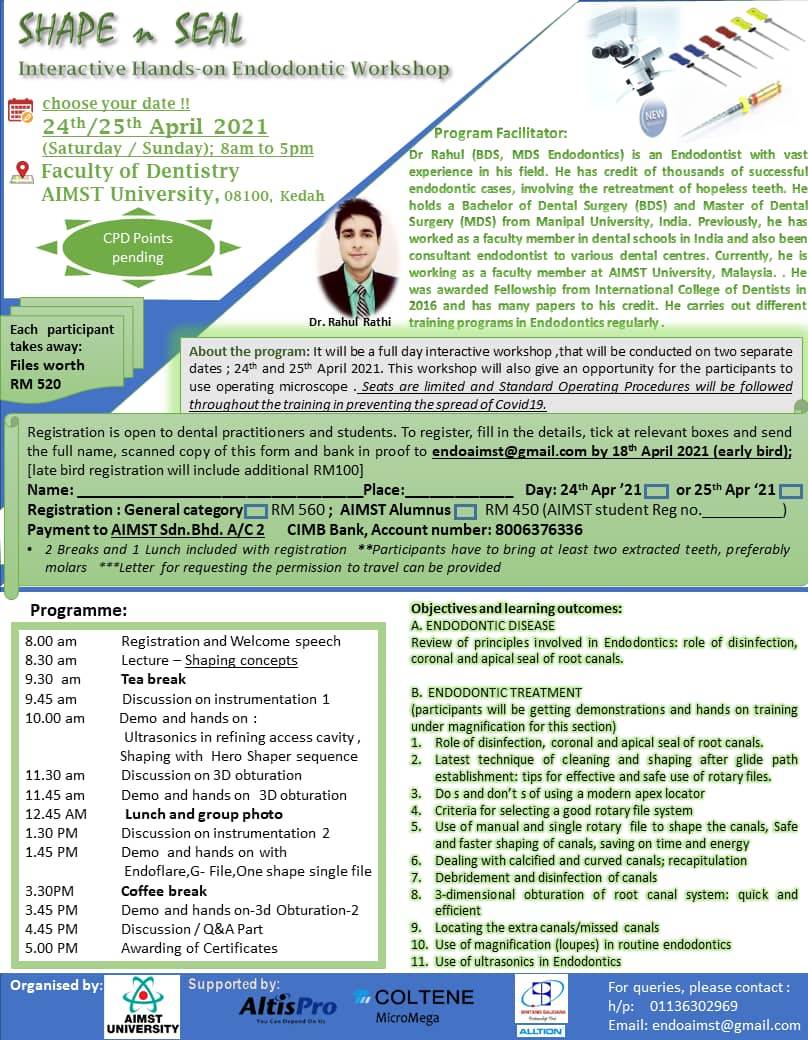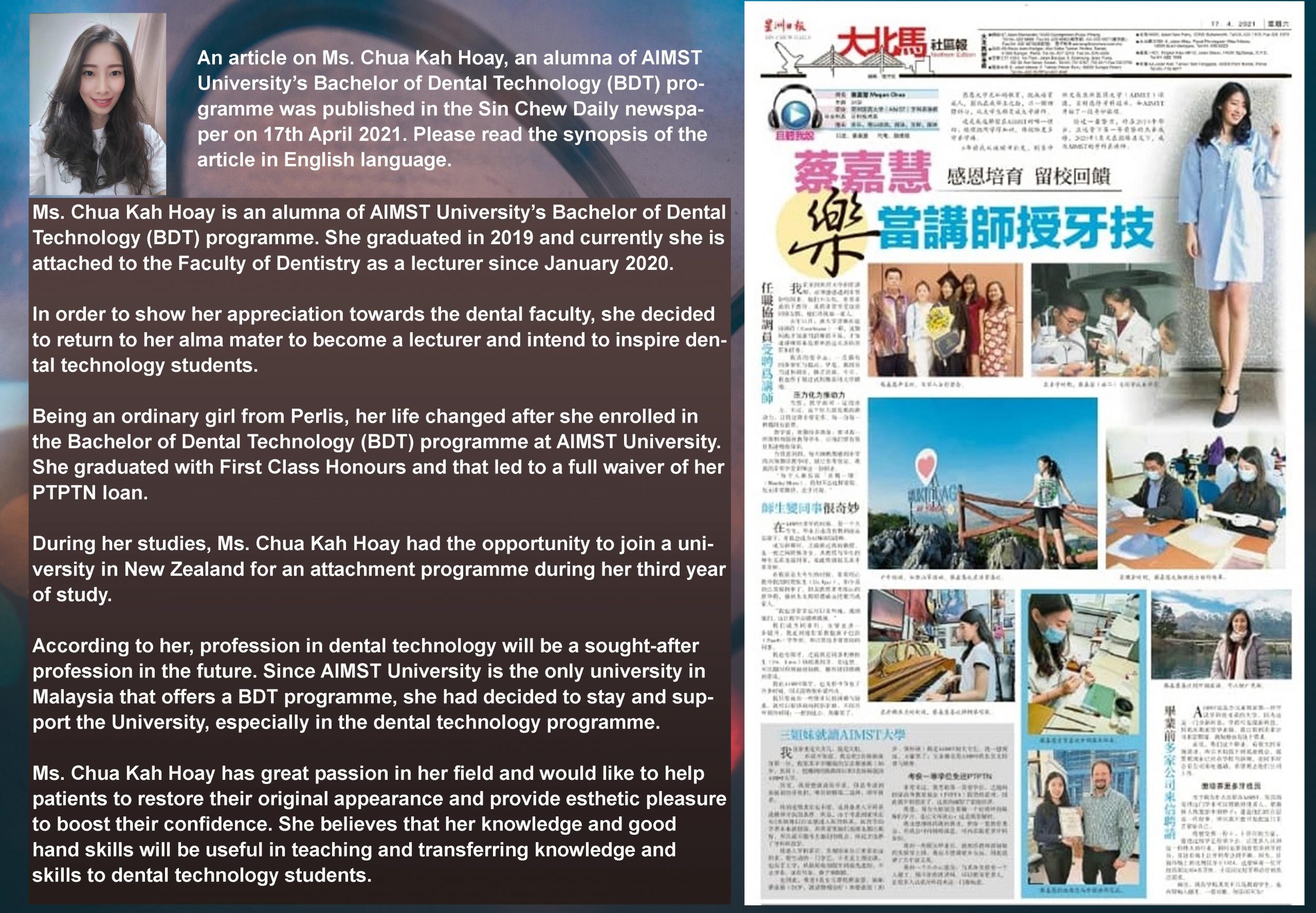AIMST UNIVERSITY STUDENT COUNCIL ELECTION 2021
CALL FOR NOMINATIONS!!! AIMST University will be conducting Student Council election to choose its new line-up for the year 2021. Hence, nominations are open for all positions and nomination forms are available with the Department of Student Affairs (DSA) or it can be requested through email at sadhis@aimst.edu.my Nominations will be open from 12 noon on Monday, 26th April 2021 and end at 4 pm on Thursday, 6th May 2021. Completed nomination forms must be submitted to DSA through email at sadhis@aimst.edu.my by 4 pm on Thursday, 6th May 2021. After the nomination process, an election will be held on Thursday, 20th May 2021. Polling will be conducted via electronic ballot and all active students are automatically registered to vote through a portal set up by the IT & AV Division on voting day. Should you require any further clarification or details, you may contact Mr. Sadhis Kumar at 016-693 2986. Click here to download Student Council Application Form
Scholarship Fair 2021 – Sg. Siput Convention Center Perak
Come and Join AIMST Scholarship Fair as we have many activities planned for you. 24 April 2021 (Saturday) 12pm - 6pm
SHAPE & SEAL – Interactive Hands-on Endodontic Workshop

‘The Tortoise and The Hare
Coordination mechanisms constitute part of good governance in government and a networked government allows for strategic collaboration not only within the public sector but across civil society. With reference to Aesop's Fable of The Tortoise and The Hare, it was proven that collaboration ensures victory for all. The Vice-Chancellor & Chief Executive of AIMST University, Professor Datuk Dr. John Antony Xavier in his opinion piece titled - Recall 'The Tortoise and The Hare' has suggested strategies for collaboration among various parties for better outcomes. The article was published in the columnist section of the News Straits Times (NST) on 20th April 2021. Click https://www.nst.com.my/opinion/columnists/2021/04/683671/recall-tortoise-and-hare to read.
A DAY WITH SPM STUDENTS
Venue: Jalan Baru Temple Penang
Date: 18 April 2021
Time:10am - 12pm
An article on Ms. Chua Kah Hoay, an alumna of AIMST University’s Bachelor of Dental Technology (BDT)
An article on Ms. Chua Kah Hoay, an alumna of AIMST University’s Bachelor of Dental Technology (BDT) programme was published in the Sin Chew Daily newspaper on 17th April 2021. Please read the synopsis of the article in English language.

AIMST INFO DAY
Event: "PROGRAM MEMBANTERAS JENAYAH" organised by MITRA
Venue: Light Hotel, Penang
Date : 17 April 2021
Time: 8am - 2pm
SPM STUDENTS MEET UP SESSION
Venue: HINDU SANGAM IPOH
Date: 17 April
Time: 6pm-8pm
Program Hari Terbuka
Venue: AIMST UNIVERSITY
Date: 17 April
Time: 8am - 12pm
Malaysia Education Fair
Venue: Setia Spice, Penang
Date: 17 & 18 April
Time: 11am - 6pm
Future for online learning
AIMST University’s Faculty of Pharmacy Deputy Dean (Postgraduate, Research, and Administration), Associate Professor Dr. Sundram M. Karupiah has come up with ways for educational institutions to overcome the digital divide among students and educators to stay relevant in the new normal of online teaching and learning. He had also listed the challenges that need to be dealt with if online learning is to be continued once the COVID-19 pandemic is over. The article titled ‘Future for online learning’ was featured in The Star’s ‘Letter to the Editor’ column on 14th April 2021. Click https://www.thestar.com.my/opinion/letters/2021/04/14/future-for-online-learning to read.
AIMST Knowledge Sharing Day
Event: Program Peningkatan Professionalisme Guru Bimbingan Kaunseling Daerah KMY
Venue: Jerai Hotel,SP
Date: 11 April 2021
Time: 8am - 2pm

